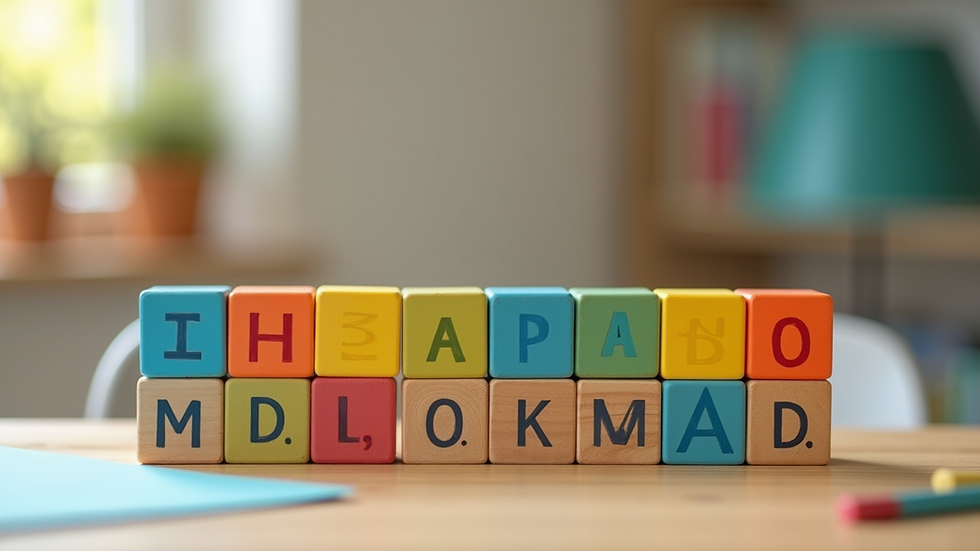Proven Techniques for Cognitive Skill Development in Kids
- Sep 2, 2025
- 3 min read
Developing strong cognitive abilities in children is essential for their success in school and life. Cognitive skills include memory, attention, problem-solving, and critical thinking. These skills help kids understand the world around them and make informed decisions. Parents and educators can use proven techniques to support and enhance these abilities from an early age.
Understanding the Importance of Enhancing Cognitive Abilities
Cognitive abilities form the foundation for learning and adapting to new situations. When children develop these skills, they become better at processing information, solving problems, and communicating effectively. Enhancing cognitive abilities also boosts creativity and emotional intelligence, which are crucial for social interactions.
For example, a child with strong attention skills can focus better in class, leading to improved academic performance. Similarly, good memory skills help children retain and recall information, making learning more efficient. By fostering these abilities, adults can help children build confidence and independence.

Effective Strategies for Enhancing Cognitive Abilities in Children
There are several practical ways to support cognitive growth in kids. These strategies are easy to implement and can be adapted to different ages and interests.
1. Encourage Play-Based Learning
Play is a natural way for children to explore and learn. Activities like building blocks, board games, and role-playing stimulate various cognitive functions. For instance, puzzles improve spatial reasoning, while memory games enhance recall abilities.
2. Promote Reading and Storytelling
Reading aloud and storytelling develop language skills and imagination. Discussing stories helps children practice comprehension and critical thinking. Ask questions about the plot or characters to encourage deeper engagement.
3. Introduce Problem-Solving Tasks
Simple challenges like sorting objects by size or color, or solving age-appropriate riddles, encourage logical thinking. These tasks teach kids to analyze situations and find solutions independently.
4. Foster Social Interaction
Group activities and cooperative games teach children to communicate, share ideas, and understand different perspectives. Social interaction also supports emotional regulation and empathy.
5. Maintain a Healthy Lifestyle
Nutrition, sleep, and physical activity significantly impact brain function. A balanced diet rich in omega-3 fatty acids, regular exercise, and sufficient rest enhance concentration and memory.
How to improve cognitive skills?
Improving cognitive skills requires consistent practice and a supportive environment. Here are some actionable recommendations:
Create a routine: Establish regular times for learning and play to build discipline and focus.
Use technology wisely: Educational apps and games can be beneficial if used in moderation and chosen carefully.
Encourage curiosity: Answer questions patiently and explore new topics together to stimulate intellectual growth.
Limit distractions: Designate quiet spaces for study and minimize background noise to improve attention.
Set achievable goals: Break tasks into smaller steps to build confidence and motivation.
Parents and educators can also track progress by observing improvements in problem-solving, memory, and attention span. Adjust activities based on the child's interests and developmental stage to keep them engaged.

The Role of Technology in Cognitive Skill Development
Technology can be a powerful tool when used appropriately. Interactive apps, digital puzzles, and educational videos offer diverse ways to practice cognitive skills. However, it is important to balance screen time with hands-on activities.
For example, apps that require children to solve math problems or complete pattern sequences can enhance logical thinking. Virtual storytelling platforms encourage creativity and language skills. Parents should select age-appropriate content and participate in activities to guide learning.
Additionally, technology can provide personalized learning experiences. Adaptive programs adjust difficulty based on the child's performance, ensuring they are challenged without feeling overwhelmed.
Supporting Cognitive Growth Through Everyday Activities
Everyday moments offer opportunities to nurture cognitive abilities. Simple actions like cooking together, gardening, or shopping can teach planning, measurement, and decision-making.
Cooking: Measuring ingredients and following recipes develop math and sequencing skills.
Gardening: Observing plant growth and caring for them enhances observation and responsibility.
Shopping: Comparing prices and making choices improve critical thinking and budgeting skills.
Incorporating these activities into daily routines makes learning natural and enjoyable. It also strengthens the bond between adults and children, creating a positive environment for growth.

For those interested in expert guidance on cognitive skill development, professional coaching services can provide tailored strategies to support each child's unique needs.
Building Lifelong Cognitive Strengths
Developing cognitive abilities in childhood sets the stage for lifelong learning and adaptability. By using these proven techniques, adults can help children unlock their full potential. Encouraging curiosity, providing stimulating experiences, and maintaining a healthy lifestyle are key components of this journey.
Remember, every child develops at their own pace. Patience and consistent support are essential. Celebrate small achievements and keep the learning process fun and engaging. With the right approach, children can build strong cognitive skills that will benefit them throughout their lives.



Comments